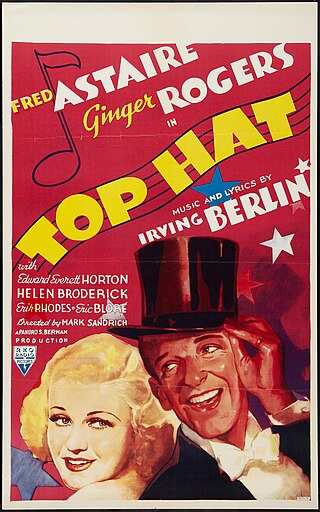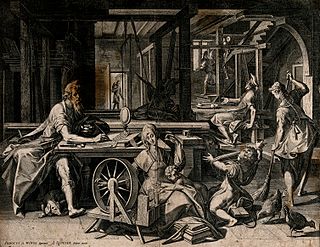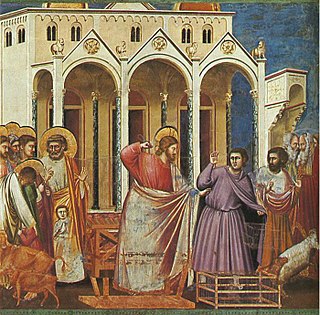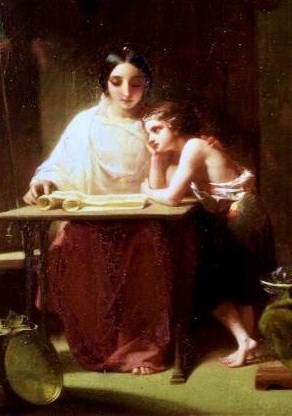
The Epistle of James is a general epistle and one of the 21 epistles in the New Testament. It was written originally in Koine Greek.

The Epistle to Philemon is one of the books of the Christian New Testament. It is a prison letter, authored by Paul the Apostle, to Philemon, a leader in the Colossian church. It deals with the themes of forgiveness and reconciliation. Paul does not identify himself as an apostle with authority, but as "a prisoner of Jesus Christ", calling Timothy "our brother", and addressing Philemon as "fellow labourer" and "brother". Onesimus, a slave that had departed from his master Philemon, was returning with this epistle wherein Paul asked Philemon to receive him as a "brother beloved".

Timothy or Timothy of Ephesus was an early Christian evangelist and the first Christian bishop of Ephesus, who tradition relates died around the year AD 97.

Top Hat is a 1935 American musical screwball comedy film in which Fred Astaire plays an American tap dancer named Jerry Travers, who comes to London to star in a show produced by Horace Hardwick. He meets and attempts to impress Dale Tremont to win her affection. The film also features Eric Blore as Hardwick's valet Bates, Erik Rhodes as Alberto Beddini, a fashion designer and rival for Dale's affections, and Helen Broderick as Hardwick's long-suffering wife Madge.

The virgin birth of Jesus is the Christian and Islamic teaching that Jesus was conceived by his mother, Mary, through the power of the Holy Spirit and without sexual intercourse.
The Jesus Seminar was a group of about 50 biblical criticism scholars and 100 laymen founded in 1985 by Robert Funk that originated under the auspices of the Westar Institute. The seminar was very active through the 1980s and 1990s, and into the early 21st century.

Lois Ann Lowry is an American writer. She is the author of several books for children and young adults, including The Giver Quartet, Number the Stars, and Rabble Starkey. She is known for writing about difficult subject matters, dystopias, and complex themes in works for young audiences.

Dale Evans Rogers was an American actress, singer, and songwriter. She was the second wife of singing cowboy film star Roy Rogers.

Priscilla and Aquila were a first-century Christian missionary married couple described in the New Testament. Aquila is traditionally listed among the Seventy Disciples. They lived, worked, and traveled with the Apostle Paul, who described them as his "fellow workers in Christ Jesus".
Inclusivism is one of several approaches in religious studies, anthropology, or civics to understand the relationship between different religions, societies, cultures, political factions etc. It asserts that there is beauty in the variety of different schools of thoughts, and that they can live together in harmony. It stands in contrast to exclusivism, which asserts that only one way is true and all others are erroneous.
Within Christianity, faith, in one sense, is often discussed in terms of believing God's promises, trusting in his faithfulness, and relying on God's character and faithfulness to act. Some denominations believe in the New Covenant and in the doctrine of salvation by faith alone. According to most Christian traditions and denominations, Christian faith requires a belief in the resurrection of Jesus, and the Agony in the Garden which Jesus states is the plan of God the Father.

Timothy David Llewelyn Hughes is a British worship leader, singer, songwriter, and Anglican priest. Formerly the director of worship at Holy Trinity Brompton, a large Anglican church in central London, he has since been ordained as a minister in the Church of England and appointed Vicar of St Luke's, Gas Street Birmingham. He leads Worship Central, an international worship training and resource centre. Hughes has written a number of songs that are sung worldwide, including the Dove Award-winning "Here I Am to Worship", "Happy Day", "Beautiful One", "Jesus Saves", "At Your Name", and "The Way".
The conditional preservation of the saints, or conditional perseverance of the saints, or commonly conditional security, is the Arminian Christian belief that believers are kept safe by God in their saving relationship with him upon the condition of a persevering faith in Christ. Arminians find the Scriptures describing both the initial act of faith in Christ, "whereby the relationship is effected", and the persevering faith in him "whereby the relationship is sustained." The relationship of "the believer to Christ is never a static relationship existing as the irrevocable consequence of a past decision, act, or experience." Rather, it is a living union "proceeding upon a living faith in a living Savior." This living union is captured in the simple command by Christ, "Remain in me, and I in you".

Butterfly Kiss is a 1995 British film, directed by Michael Winterbottom and written by Frank Cottrell Boyce. It stars Amanda Plummer and Saskia Reeves. The film was entered into the 45th Berlin International Film Festival.
Lewis's trilemma is an apologetic argument traditionally used to argue for the divinity of Jesus by postulating that the only alternatives were that he was evil or mad. One version was popularized by University of Oxford literary scholar and writer C. S. Lewis in a BBC radio talk and in his writings. It is sometimes described as the "Lunatic, Liar, or Lord", or "Mad, Bad, or God" argument. It takes the form of a trilemma—a choice among three options, each of which is in some way difficult to accept.

In Christianity, the term biblical authority refers to two complementary ideas:

In the Lutheran Church, Confession is the method given by Christ to the Church by which individual men and women may receive the forgiveness of sins; according to the Large Catechism, the "third sacrament" of Holy Absolution is properly viewed as an extension of Holy Baptism. Unlike Roman Catholicism, the practice of private confession in the Lutheran Church is voluntary, not obligatory.

There have been a variety of Christian views on poverty and wealth. At one end of the spectrum is a view which casts wealth and materialism as an evil to be avoided and even combated. At the other end is a view which casts prosperity and well-being as a blessing from God.
"The Name Game" is the tenth episode of the second season of the FX anthology television series American Horror Story. The episode, written by Jessica Sharzer and directed by Michael Lehmann, originally aired on January 2, 2013. The episode is named for the 1964 song of the same name by Shirley Ellis, which is performed by the cast in the episode. The cast version of "The Name Game" was available for purchase through iTunes. This episode is rated TV-MA (LSV).

According to the New Testament, Eunice was the mother of Timothy and influenced his faith in Christ. Born into the Jewish faith, she and her mother Lois accepted Christianity.












